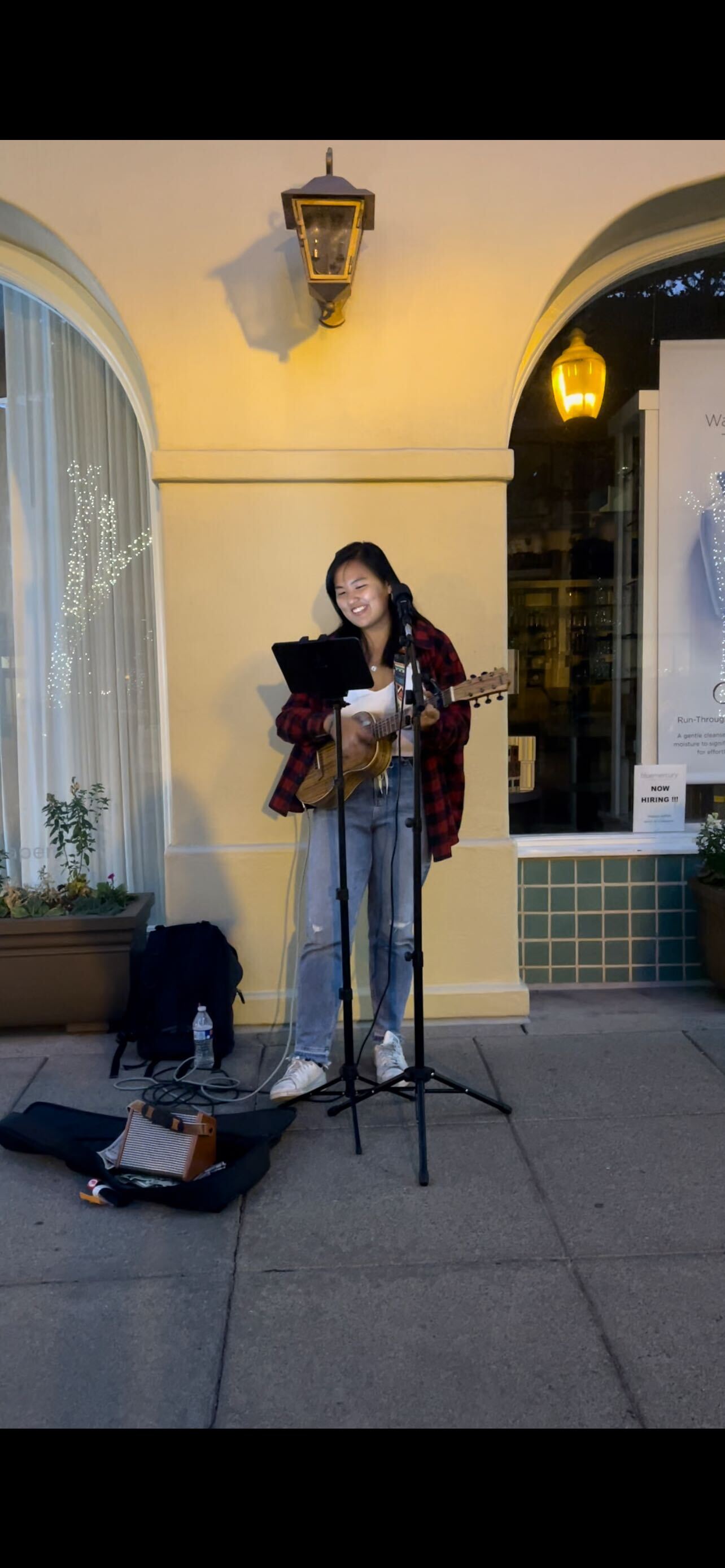It’s 2014. From an apartment in Hong Kong, an iMac screen glows with a row of tabs all displaying YouTube videos of Western 60s music. With a guitar resting on her lap, a newly 12-year-old Emma Wong ’24 strums along to a scratchy tape of The Beatles, familiarizing herself with the instrument she had just received for her birthday. As she molds new chords into her memory, she eventually does the same to American culture — an environment in which Wong would find herself immersed in six years later as a first-year Stanford student.
For Wong, speaking a multitude of languages was an everyday occurrence living in Hong Kong. From conducting family dinner conversations in Cantonese to learning Spanish and Mandarin in her classes, Wong grew to appreciate the melodies of many languages.
“I feel like growing up in Hong Kong was so wonderful because it’s such a globalized city — there’s so much diversity,” she said. “[With] my extended family on my mom’s side, we [can] sing happy birthday in eight languages. So we just always sing it in every language that we know.”
With a strum of the first chord on her guitar, Wong was introduced to a new language to add to her collection — the language of music.
In 2020, Wong landed in the United States for her studies at Stanford, bringing along her passion for music. During her first exploration of Palo Alto, she came across a woman standing in the center of the street — closed off for COVID-19 outdoor dining — singing for passersby and playing an instrument similar to Wong’s guitar: a ukulele.
“She sounded so good,” Wong recounted. “Halfway through her set, I went to talk to her and I told her, ‘I think it’s so awesome that you do this. Tell me more about yourself.’”
As it turned out, the street singer-musician was a biochemistry researcher at Stanford, who shared guidance and advice with Wong about navigating the avenues of music performance.
“I texted her a little bit. I was like, ‘What app do you use? Do you need a permit to do this?’” Wong said. “She gave me all the answers.”
Soon after her conversation, Wong became inspired to share her music in a similar way. However, her concerns rose when she heard the stories of violence and hate toward Asian Americans in the United States due to COVID. These types of crimes increased drastically in 2020 — the first year of the pandemic — notably in large cities, such as nearby San Jose.
“I was so scared that I was going to face that kind of response from my audience when I first went out to perform,” Wong said.
Still, Wong set out to the corner outside ice cream shop Salt and Straw on University Avenue. Laying out her guitar case open-faced on the sidewalk, she prepared for her very first set.
“I was singing so quietly, and I didn’t want to turn the volume up on my amplifier,” Wong said, recalling her experience. “But then this guy came by and he just started dancing, and he said, ‘You should be more relaxed, you sound really good. You should sing louder.’ And because he was dancing, that got people involved and definitely caught the audience’s attention.”
Following the interaction, Wong began returning to her downtown spot each Sunday, guitar strap across her shoulder and lips behind a microphone. Almost every time she performs, her first fan still heads to her stand to dance.
Taking inspiration from her hometown of Hong Kong, Wong introduced Chinese songs alongside English songs in her performances. She found that her audience enjoyed listening to her songs in Chinese — even if they did not understand — as much as she enjoyed sharing them.
“It’s wonderful because there’s so many travelers who visit Stanford and go through Palo Alto, and so to meet these people and get to speak to them and sing songs in their language is just really nice,” said Wong.
During her performances, many listeners approached Wong to start conversations about their passions and life experiences. The stories struck Wong, who became inspired to give back to her community.
Wong donates the proceeds of her performances to a different charity each month, as chosen by her listeners; a QR code she displays allows audience members to share suggestions about the causes important to them.
Wong’s music has resonated with Stanford students as well. Jessica Chen ’24, a friend of Wong’s, said that Wong enjoys teaching other students how to involve themselves with music. For Chen, her friend’s songs have a calming and refreshing effect. “I heard her play the guitar and sing, and that was just really, really beautiful,” she said.
Fellow friend Sze En Tan ’24 also highlighted Wong’s quick ability to incorporate songwriting even into academic assignments. Instead of writing a poem for an intro seminar on polar exploration, Wong wrote a song. “I was dumbfounded because I thought that [writing a song] was way harder than writing a poem, but she shared that she had been writing songs for quite some time and really enjoyed the process,” Tan wrote.
As for her next steps, Wong certainly sees herself continuing music in the future, hoping to record her original songs and learn how to produce music. “I know that there’s a bunch of new skills involved, but I’m excited to learn.”
